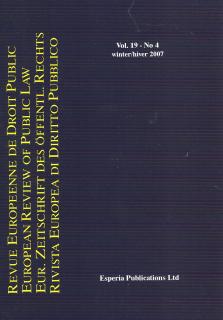
Constitutional Law / Droit constitutionnel
2007
Serbia / Serbie
Violeta Beširević
Vice Dean of Academic Affairs, Union University Law School, Belgrade, Serbia
According to international public law, territory, population and an effective government are elements which constitute a state. Serbia entered the year 2007 with none of these elements being effectively determined. As to the territory, it continued to claim sovereignty over Kosovo, the province under the UN administration since 1999, whose present status was fixed by the Resolution 1244 of the UN Security Council within the borders of the former Federal Republic of Yugoslavia. As to the population, neither Albanians living in Kosovo regarded and recognized Serbia as their state nor did the Serbian authorities or major political players regard them as Serbian citizens. This sharply contrasted with the position of the Serbian minority in Kosovo: Serbs from Kosovo claimed the Serbian citizenship while the state establishment treated them as Serbian citizens for voting or any other purposes. As to the effective government, following the parliamentary elections at the beginning of the year, Serbia got a new government on May 15, half an hour before the midnight, just before the constitutional deadline was about to elapse. In addition, the country spent almost the whole year without an operational Constitutional Court, which, when finally formed in December, after more than one year went out of blockade. In the international fore, things were not less complicated. First, in February, a kind of relief, though not complete, came from The Hague: in the long-waited decision, the International Court of Justice found that, although the Serbian government was not directly responsible for genocide during the Bosnian war, the country failed to meet its obligations under the 1948 Genocide Convention to prevent genocide. At home, it was interpreted that the decision cleared Serbia of genocide. Then, in June, the country resumed the SAA negotiations with the EU, called off in 2006. As a result, in November, the EU and Serbia initialed the SAA. Yet, this does not mean that now the country is on the safe track with regard to the EU accession since the Serbian Prime Minister, by openly saying that Serbia was not ready to join the EU at any costs, shook the developments at the end of the year. Generally, the whole year was marked by straggling to avert a long-announced proclamation of Kosovo’s independence. The fight against its loss, guided constitutional developments, as well. The chronicle closely elaborates the above-mentioned points. As 2007 was the initial year in which the new Constitution was implemented, the summary of its major characteristics are presented first.





















